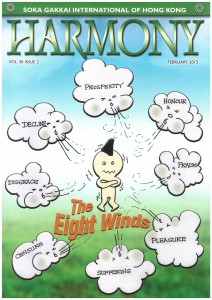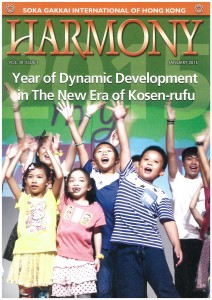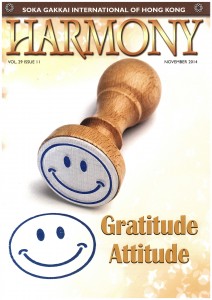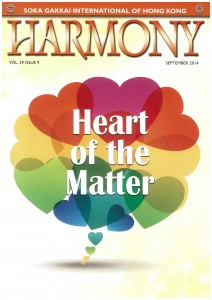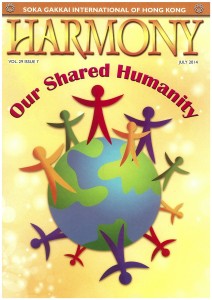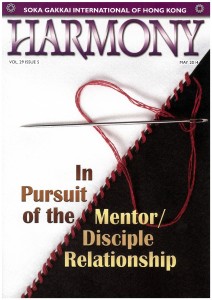HARMONY-February 2015
Thu, 29th Jan 2015
Category : Harmony, News (All), Publication
DEAR MEMBERS AND FRIENDS OF SGI,
This month we look at the Buddhist concept of The Eight Winds.
All too often we can be swayed by our environment. After all, we are only human. If we are not careful, external influences can become the only thing that determines how we act and feel. Quite frequently, our happiness is based on what is happening to and around us. But as practitioners of Nichiren Buddhism, we realize that we have the means to become absolutely happy, regardless of the circumstances we might find ourselves in. We don’t have to succumb to the turbulent winds of our environment or let someone else determine our happiness. We should not to be swayed by our attachment to prosperity, honor, praise, or pleasure (the four favorable winds), or by our aversion to decline, disgrace, censure, or suffering (the four adverse winds).
Regardless of our circumstances, we should not have any doubt in he power of chanting Nam-myoho-renge-kyo (daimoku) or in our prayers.
Nichiren Daishonin states:
“Although I and my disciples may encounter various difficulties, if we do not harbor doubts in our hearts, we will as a matter of course attain Buddhahood. Do not have doubts simply because heaven does not lend you protection. Do not be discouraged because you do not enjoy an easy and secure existence in this life. This is what I have taught my disciples moning and evening, and yet they begin to harbor doubts and abandon their faith.”
Our Buddhist practice has the power to transform any suffering of disappointment into joy. It can also help prevent a victory from becoming the source for a defeat.
As President Ikeda reminds us in this month’s editorial, “That’s why we must always put daimoku first, whatever the situation. A person who chants strong and consistent daimoku will never be deadlocked.”
Let’s challenge each day with abundant daimoku that is like the roar of a lion king!
Skip Williams
Quotes of the Month:
“Never conduct yourself in a shameful manner. Be unmoved by greed, by the desire for fame, or by anger.”
HARMONY-January 2015
Tue, 23rd Dec 2014
Category : Harmony, News (All), Publication
Happy New Year in the “Year of Dynamic Development in the New Era of Worldwide Kosen-rufu”! On behalf of the Harmony Team we wish you a wonderful 2015 and look forward to your continuing patronage in the coming year.
The beginning of the year is traditionally a time when people the world over set new goals and renew their determinations for the coming year.
As members of the SGI, we are encouraged to set lofty goals for our lives. At the same time, not just focusing on ourselves, we also include the well-being of others when making our resolutions. As Buddhists, we recognize and embrace the concept of the interconnectedness of all things. Thus, it is not simply a wish for the environment and all those in it to thrive, but it is a crucial part of our own well-being and happiness.
Members of SGI strive to spread the teachings of Nichiren Buddhism, which places the highest priority on respect for the dignity of human beings and indeed, all life. And as we strive in our human revolution, such inner transformations will lead to absolute happiness for ourselves and ultimately for society, far and wide.
As President Ikeda says in his New Year’s Message, we are “committed to spreading the SGI’s hope-filled philosophy of respect for the dignity of life even more widely throughout our blue planet, the grand stage of our endeavors.”
As members of the SGI, we speak again and again about the great mission of kosen-rufu. We have dedicated this issue of Harmony to explain this concept in greater depth and to help clarify what it is and is not.
President Ikeda has written:”Kosen-rufu means sharing with our fellow human beings through heart-to-heart dialogue and friendship, striving together with them to find the way to become better and happier people. That alliance of individuals working for the happiness of all constitutes kosen-rufu.”
We have a daily practice, which effectively makes every day like New Year’s Day – an opportunity to start afresh with hope and determination. In light of that, I would like to close with the following two quotes.
“Be bold, Be bold, and everywhere, be bold.”
“Whatever you can do, or dream you can, begin it. Boldness has genius, power, and magic in it.”
Skip Williams
Quotes of the Month:
“In Buddhism, we either win or lose-there is no middle ground. Now and in the future, let us advance, determined to win in every sphere of our lives. By winning in our lives, we advance kosen-rufu; and by advancing kosen-rufu, we win in our lives.” - Daisaku Ikeda FIA p.74
HARMONY-December 2014
Wed, 3rd Dec 2014
Category : Harmony, News (All), Publication
This month we look at Earthly Desires and how, when viewed correctly, they can help us become happy.
“When we chant Nam-myoho-renge-kyo, our problems and sufferings all turn into energy for our happiness, into fuel for our enlightenment.”
Growing up in the US, my exposure to Buddhism was limited and shaped by what I saw on TV, in the movies, and what little I read. I thought that “being a Buddhist” meant you had to change your diet, how you dress, live a monastic lifestyle, and give up all worldly possessions and desires. But after I started to practice and study Nichiren Buddhism, I came to realize that this common view was incorrect. It is possible to be a Buddhist and want things in life. We are, after all, human. I can’t tell you the number of times that someone has said to me “funny, you don’t look like a Buddhist”.
As President Ikeda mentions:
“Buddhism teaches the principle that ‘earthly desires are enlightenment.’ To explain this very simply, ‘earthly desires’ refers to suffering and to the desires and cravings that cause suffering, while ‘enlightenment’ refers to attaining a vast and expansive state of absolute happiness.
“Normally, one would assume that earthly desires and enlightenment are separate and distinct-especially since suffering would seem to be the exact opposite of happiness. But this is not the case in Nichiren Buddhism, which teaches that only by igniting the firewood of earthly desires can the flame of happiness be attained.
“As a result, our lives are infused with the light and energy of happiness. Through chanting Nam-myoho-renge-kyo, we burn the firewood of our earthly desires.”
It is important that we really grasp and understand this principal.
Nichiren Daishonin wrote a letter titled “Earthly Desires Are Enlightenment” in order to emphasize the importance of this core principle to all of us and to ensure that, through strong faith, we are able to view Earthly Desires in the correct light and lead lives of absolute happiness and freedom based on this awareness.
We hope you enjoy this issue of Harmony.
Skip Williams
Quotes of the Month:
“Prayer is the courage to persevere. It is the struggle to overcome our own weakness and lack of confidence in ourselves. It is the act of impressing in the very depths of our being the conviction that we can change the situation without fail.” –www.ikedaquotes.org
HARMONY-November 2014
Thu, 6th Nov 2014
Category : Harmony, News (All), Publication
Cultivating and maintaining an attitude of gratitude is a lifelong process. It appears that our brains are programmed to have much deeper memory and faster recollection for negative experiences than happy ones. Scientific research shows this again and again as a basic and wide-ranging principle of psychology. It is perhaps meant as an evolutionary protective mechanism to remind and stop us from repeating some situations.
Other research shows that happy people are those who have the ability to set aside negative experiences and recall more of their positive experiences. So what marks the difference between a happy and an unhappy person is not the amount of either positive or negative situations they experience, but the way they focus their attention on the positive rather than the negative.
In Buddhism we do not judge events as either positive or negative; we look at situations from the perspective of the Ten Worlds, and depending in which life-state we dwell, we regard our circumstances accordingly. Our life-state is ever changing and without a solid Buddhist practice, we can easily be swayed from a state of perfect bliss and happiness into a deep and dark depression triggered by our thoughts and circumstances.
So how do we get out of the negativity loop and develop this “Attitude of Gratitude”? President Ikeda says: “Viewing events and situations in a positive light is important. The strength, wisdom and cheerfulness that accompany such an attitude lead to happiness. To regard everything in a positive light or with a spirit of goodwill, however, does not mean being foolishly gullible and allowing people to take advantage of our good nature. It means having the wisdom and perception to move things in a positive direction by seeing things in their best light while all the time keeping our eyes firmly focused on reality.”
We need wisdom and a strong Buddhist practice fueled with both study and abundant chanting of Nam-myoho-renge-kyo to lift our life condition to the point where we truly appreciate everything about ourselves and around us. When we see the world with the Buddha’s eyes, we cannot help but be filled with absolute gratitude for our life and the great mission we have.
Carola Chard
Quotes of the Month:
“What can we say, then, of persons who are devoting themselves to Buddhism? Surely they should not forget the debts of gratitude they owe to their parents, their teachers, and their country. But if one intends to repay these great debts of gratitude, one can hope to do so only if one learns and masters Buddhism, becoming a person of wisdom.”
(WND1 On Repaying Debts of Gratitude p.690)
HARMONY-October 2014
Wed, 15th Oct 2014
Category : Harmony, News (All), Publication
We often associate the setting of goals, determinations, and making a fresh start to coincide with New Year celebrations – the big time to reset the clocks and our life. In reality, every day and every moment is an opportunity for a fresh start.
We get up in the morning , brush our teeth and wash our faces, making a clean, fresh start to the day for our body. We make our beds and tidy the house, to ensure it is all nice and fresh. We even reboot our electronics on a regular basis to ensure the best performance.
But what do we do about our mind? Are our thoughts fresh? Is our mind open to approach each new day with vigor and joy, or does it remain dull and cluttered with thoughts and worries about yesterday, tomorrow and beyond? Even though we know that dwelling on the past does not resolve any problems of the future, human nature is such that we ignore all the positive opportunities ahead and instead look back and frequently ask ourselves why this, why that, why me?
Nichiren Buddhism teaches that no matter what our situation, no matter how deep and dark our despair, we are reassured, that the moment we chant Nan-myoho-renge-kyo, our life expands and we infuse our life with the wisdom of the Buddha and move forward in a positive direction. Buddhism is reason and manifests in daily life, so let’s celebrate our life with vibrant gongyo and chanting of Nam-myoho-regnge-kyo so that all our actions become the Buddha’s work.
Our daily gongyo is the point of starting afresh. As President Ikeda says:
“When we do gongyo and chant daimoku, we conduct a ceremony in which we praise Nam-myoho-renge-kyo, the law of the universe, and the Buddha. We also praise the eternal life of the universe, and the world of Buddhahood in our own lives.
[When we chant to the Gohonzon] right then and there the doors of the microcosm within us open completely to the macrocosm, and we can experience a great and serene sense of happiness, as though gazing out over the entire universe. We savor tremendous fulfillment and joy, and gain access to a great and all-embracing wisdom. The microcosm of our lives that is encompassed by the universe in turn encompasses the entire universe.”
We sincerely hope that the contributions and articles in this issue will inspire you to re-determine your goals and focus on positive changes in your life.
Let’s make it a fresh start, every day to create value!
Carola Chard
Quotes of the Month:
“Gongyo revitalizes us from the very depths of our being. Therefore, the important thing is to do gongyo each day filled with a feeling of rhythm and cadence—like a white horse galloping through the heavens. I hope you will do the kind of satisfying gongyo that leaves you refreshed and revitalized in both body and mind.”
HARMONY-September 2014
Thu, 28th Aug 2014
Category : Harmony, News (All), Publication
The heart of the matter in Buddhism is that our heart matters most. This philosophy of life is based on the teachings of Nichiren Daishonin, who through sincere dialogue with his followers, enabled them to understand the concepts of Buddhism and the meaning of their lives. Following this way, the members of SGI engage in discussion meetings and have open dialogue to support each other in the journey of faith. President Ikeda keeps reminding us that sincere dialogue is the way to understand each other better, and ultimately is the key to world peace.
Dialogue requires us not just to be able to speak eloquently – but also to hone our listening skills. Those wanting to grow in their Buddhist practice will have a seeking spirit and will have many questions. Therefore, it is crucial that we study to deepen our understanding and knowledge of this wonderful philosophy of life.
What matters most when we engage in dialogue is our intent. Are we really caring and compassionate towards our friends, and sincere in our effort to help, or are we just talking for the sake of talking and pushing our personal views upon others? Are we listening to the other person, or are we thinking of what we will say next? Words once spoken cannot be taken back, and one careless hurtful remark can break the trust and friendship between people. At the same time, an endless stream of complaints under the guise of dialogue will not bring any benefit at all – in fact it is one of the major slanders we risk committing in our daily lives. Once we start complaining, we are undoing good causes we have assiduously made in our life.
Let’s be mindful of the effect our words have on ourselves and others before we speak, and strive to be positive, encouraging and supportive.
Let’s also include those thoughts we have in our hearts and heads, as that is where the cause is initially made. We cannot reach someone’s heart, even with the sweetest words, if our mind and our heart does not really think and feel the words we speak. Our thinking is also crucial to our own inner dialogue. How can we be compassionate towards ourselves and others if we allow our own inner voice to keep putting us down?
The best foundation for a heart-to-heart dialogue is to chant sincerely to lift our life condition and really be open to absorb and understand the situation clearly. With the life state of the Buddha, we will be able to master our minds and communicate through the smallest word, or even silence.
Everything begins with prayer.
Carola Chard
Quotes of the Month:
“To lead a life in which we are inspired and can inspire others, our hearts have to be alive; they have to be filled with passion and enthusiasm. To achieve that, we need the courage to live true to ourselves. Rather than borrowing from or imitating others, we need the conviction to be able to think for ourselves and to take action out of our own sense of responsibility.” -Daisaku Ikeda (Ikedaquotes-power of the heart)
HARMONY-August 2014
Thu, 31st Jul 2014
Category : Harmony, News (All), Publication
DEAR MEMBERS AND FRIENDS OF SGI,
This month of August holds great significance in the SGI for a number of reasons. August is the month that the men’s division, the golden pillars of kosen-rufu, was established. August is also the month that the third president of the Soka Gakkai, Daisaku Ikeda, first took faith in Nichiren Daishonin’s Buddhism, an event that has had far reaching implications. Were is not for the bond of mentor and disciple formed between Mr. Toda and Mr. Ikeda, the Soka Gakkai organization would not be what it is today.
In this issue we look at Revealing the True. The concept of “casting off the transient and revealing the true” can be hard to comprehend. But as you will read in our Special Features, it is really quite easy to grasp and understand, though sometimes challenging to accept and embrace. President Ikeda gave a great example when he said:
“A classical Japanese comedy tells the following story: Once there was a country village where no one had a mirror. In those days, mirrors were priceless. A man, returning from his trip to the capital, handed his wife a mirror as a souvenir. That was the first time for her to see a mirror. Looking into it, she exclaimed: “Who on earth is this woman? You must’ve brought a girl back with you from the capital.” And so began a big fight.
“Though this story is fictitious, many people become angry or grieve over phenomena that are actually nothing but the reflection of their own lives – their state of mind and the causes that they have created. Like the wife in the story who exclaims, “Who on earth is this woman?” they do not realize the folly of their ways.
“Because they are ignorant of Buddhism’s mirror of life, such people cannot see themselves as they truly are. This being the case, they cannot guide others along the correct path of life nor can they discern the true nature of occurrences in society.”
We would also like to draw your attention to a new series that we are very happy to present entitled The Wisdom For Creating Happiness And Peace. We hope that our readers will find this series to be both illuminating and inspiring, and as you continue to polish the mirror of your own lives through your Buddhist practice, that happiness and contentment fill your every day!
Skip Williams
Quotes of the Month:
“In commenting on this passage, I have this to say: Shakyamuni taught that the shallow is easy to embrace, but the profound is difficult. To discard the shallow and seek the profound is the way of a person of courage.” (WND1, p.558)
HARMONY-July 2014
Fri, 4th Jul 2014
Category : Harmony, News (All), Publication
Although people appear very different, we are fundamentally the same. That is the main principle of the Lotus Sutra and Nichiren Buddhism.
People are born into various social, economic, geographical and ethnic situations. Out of the billions that inhabit the Earth, no two people are exactly the same. Everyone is unique, with his or her own distinctive characteristics and qualities.
We inhabit the same planet and breathe the same air. The traits of being human remain the same in spite of different geographic locations, gender, race, color, creed or sexual orientation. No matter what our status in society, we are subject to the four sufferings of birth, aging, sickness and death. Nichiren Buddhism teaches we have a shared humanity and all of us, without exception, possess the Buddha nature.
Technology has helped us to become closer and less isolated, gaining global perspective. While the high dependence on the latest gadgets has some drawbacks, technology and social media have increased our awareness of what is happening in other parts of the world. It makes it easier for us to be sympathetic to the challenges people in other countries are facing. Feeling empathy for others’ plight is what our shared humanity is all about.
When we are preoccupied with our own issues, it’s not easy to feel care and compassion for anyone in our immediate environment, let alone strangers in some faraway place. People are judgmental and can find it easy to dismiss anyone they cannot relate to, failing to recognize that the person has the same basic needs, wants and desires as all of us.
President Toda once said: ”At the root of various injustices and discrimination in society lie fear and insecurity; such prejudice is the product of human cowardice and weakness.”
Overcoming this discrimination can be accomplished with the recognition of our interconnectedness and shared humanity.
This concept is recognized in the Universal Declaration of Human Rights by the UN, which states: ”Human rights are rights inherent to all human beings, whatever our nationality, place of residence, sex, national or ethnic origin, colour, religion, language, or any other status. We are all equally entitled to our human rights without discrimination. These rights are all interrelated, interdependent and indivisible.”
By recognizing the inherent Buddhahood in others, by understanding our shared humanity, we can change our perspective and the way we approach people and situations. We will be less likely to be driven by the destructive impulses of the three poisons of Greed, Anger and Ignorance. We will be less likely to be dominated by the Four Evil Paths (Hell, Hunger, Animality and Anger), the four lower life states that are characterized by suffering. We will be more likely to treat others with the respect and dignity they deserve, regardless of the circumstances. It will be easier to find common ground to move things forward in a positive manner, a win-win scenario. After all, we are all in this together.
For more on this subject, please visit:
http://wwwsgi.org/resource-center/video-and-audio/what-is-sgi-videos/our-shared-humanity-an-introduction-to-the -sgi-buddhist-movement/
Skip Williams
Quotes of the Month:
“Human dignity does not shine in isolation. It comes to full brilliance through our efforts to cast a bridge connecting the opposing banks of self and other. In the teachings of Buddhism we find these words: ‘If you light a lantern for another, it will also brighten your own way.’ (GZ1598) Actions taken to illuminate the dignity of others inevitably generate the light that reveals our own highest aspects.”-Daisaku Ikeda 2014 Peace Proposal
HARMONY-June 2014
Thu, 19th Jun 2014
Category : Harmony, News (All), Publication
June is the month we look at Peace, as it has become tradition with Harmony.
As our cover states, “Peace is greater than no war”. There is so much more to peace than just the absence of war. Peace means people have their basic human right to live free of fear in a harmonious society with ample food, shelter and education.
Peace requires a deep respect for life and the willingness to engage in open dialogue to overcome differences and conflict.
“Our efforts are based on the belief that it is dialogue, first and foremost, that opens one heart to another. However slow this process may appear, we are convinced that it is the most certain path to world peace.”
It is also to rise above and not succumb to the four lower life-states of Hell, Hunger, Animality and Anger. What we commonly refer to as the four evil paths.
“Buddhism regards violence as a manifestation of the destructive impulse within human life. Although it cannot be entirely eliminated, this impulse can be controlled. I am convinced that we have the wisdom to adjust and alter our social system to prevent violent outbreaks.”
“Empathy with others’ pain must form the core of our approach (to peace). As long as human beings resort to violence to solve problems, they will forever be trapped in this cycle of hatred and violence. Some people argue that sacrificing others and taking lives are permissible as means to a greater end. We must disabuse everyone of this notion.
“Because it undervalues life, the culture of war should be fundamentally questioned. My friend Joseph Rotblat would repeat the adage, ‘If you want peace, prepare for peace’ (Si vis pacem para pacem). It is wrong to assume that peace can ever be realized through the means of war.”
As President John F. Kennedy so aptly put it:
“First: Let us examine our attitude toward peace itself. Too many of us think it is impossible. Too many think it unreal. But that is a dangerous, defeatist belief. It leads to the conclusion that war is inevitable—that mankind is doomed-that we are gripped by forces we cannot control.
We need not accept that view. Our problems are manmade—therefore, they can be solved by man. And man can be as big as he wants. No problem of human destiny is beyond human beings. Man’s reason and spirit have often solved the seemingly unsolvable-and we believe they can do it again.”
This month we are pleased to include SGI President Daisaku Ikeda’s 2014Peace Proposal, “Value Creation For Global Change: Building Resilient and Sustainable Societies”.
Skip Williams
Quotes of the Month:
“Nothing is more precious than peace. Nothing brings more happiness. Peace is the most basic starting point for the advancement of humankind.”–(Daisaku Ikeda, NHR v1, p1)
Wed, 30th Apr 2014
Category : Harmony, News (All), Publication
DEAR MEMBERS AND FRIENDS OF SGI,
This month we celebrate May 3rd, Soka Gakkai Day. It was on this day that both Mr. Toda and Mr. Ikeda were inaugurated as the second and third presidents respectively of the Soka Gakkai. In light of the occasion, we look at the Mentor-Disciple relationship in this issue of Harmony.
As you will read in our Special Features, the Mentor-Disciple relationship is of great significance in Nichiren Buddhism. All of us today are able to change our lives through faith in this Buddhism because of the Mentor-Disciple relationship. It is something that dates back to the beginnings of Buddhism. As was so eloquently explained in The Human Revolution(p.1965): “It takes a human being to raise and foster another human being. The mentor and disciple relationship had been a core element of Buddhism from its earliest days. Buddhist practice has its origins in those who decided on their own accord to embrace the Buddha, Shakyamuni, as their mentor, following him and listening to him preach the Law. The mentor-disciple relationship of Buddhism is different from any societal system or contract. It is always based on the free and spontaneous will of the individual, and expression of that person’s seeking spirit. It has nothing to do with personal gain or self-interest. It is a spiritual bond of the purest kind, arising from a desire to pursue a life dedicated to the highest truth. Because of this, the bond of mentor and disciple is as strong and imperishable as a diamond.”
The Mentor-Disciple relationship in Buddhism is not one that is top-down, or even bottom-up. The mentor does not look down at the disciple, thinking they are superior and above everyone else. At the same time, the disciple does not put the mentor on a pedestal as someone who is blindly worshiped or idolized. It is an egalitarian relation, where both the mentor and the disciple are deeply committed to advance together in faith.
The disciple holds deep respect for whom the mentor is, for the merit of what has been achieved and what the mentor still wants to accomplish. The disciple embraces the mentor’s vow as his or her own, walking side-by-side, as the work together to achieve this shared commitment; the happiness of all people.
As you will read from President Ikeda’s quote in our Viewpoint; “The relationship between mentor and disciple can be likened to that between needle and thread. The mentor is the needle and the disciple is the thread. When sewing, the needle leads the was through the cloth, but in the end it is unnecessary and it is the thread that remains and holds everything together.”
We hope you enjoy this issue of Harmony.
Skip Williams
Quotes of the Month:
“One who refuses to seek the advice of others will eventually be led to a path of ruin. A mentor helps you to perceive your own weaknesses and confront them with courage. The bond between mentor and protégé enables us to stay true to our chosen path until the very end.”–www.ikedaquotes.org

